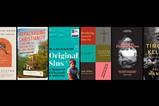If the past year has taught us anything, it’s that change is unavoidable. Sarah Yardley shares her top tips on choosing joy regardless
When I began the journey towards writing a book on change almost three years ago, I had no understanding of how our world would be transformed. I’d thought the book might be helpful to one or two close friends: the ones navigating the changes of new babies, university careers or loves lost and found. I had no idea that in summer of 2021, a book on change would feel relevant to almost everybody.

The one thing we have all lost in this past year is a sense of certain and stable future planning. Yet over and over again, in the changes that have come – whether positive or negative, inflicted upon us or willingly embraced – we are also presented with the opportunity to choose joy. We can choose joy in the lockdowns, the accidental homeschooling, the Zoom meetings and the isolation. We can choose joy in new pathways, old friendships and in uncertainty. We can choose joy in the changes that were necessary and in the ones that exceeded the boundaries of any expectation.
CHANGING WORLD, UNCHANGING GOD
The anchoring idea of this book – and of my whole life – is the joyful certainty that comes in knowing an unchanging God in the midst of a world of continual change. My life has been marked by key chapters of change over 30-odd years; I moved from sunny California to (often) wild and windy Cornwall, from an evangelical megachurch in Orange County to a small, seaside Methodist church in Polzeath, from a place where I was deeply known and loved to one where I lived for several years in deep loneliness, from the bustling pace of city life to a rural community.
Experiencing change has been one of the most beautiful yet aching journeys of my life. It’s often easy for us to speak of the places where change has opened new doors, new chapters and new friendships. It is far more difficult to speak of the places where every change comes with a sense of loss. Both ideas are true, but there are glimpses of glory in every chapter of change. In reflecting on the way we choose joy in times of change, here are three ideas that have helped shape my soul towards Christ.
1. CHOOSE JOY IN THE EVERYDAY
In everyday realities, we choose the story we tell ourselves and others. We can either choose to see our lives through our places of pain, weariness and exhaustion or choose to see them through the redemptive lens of grace and the kindness of a God who allows no experience in our lives to be wasted. This often requires the recalibrating of our hearts and rewiring of our mindsets.

In The Other Half of Church (Moody Press), Jim Wilder and Michel Hendricks speak of the spiritual formation required to reset our mental pathways to joy, describing the journey as a pathway that needs to be forged in our mental habits. The first time that you walk this path it can feel rough underfoot – it’s full of obstacles and thorny distractions. But the more you choose to walk the pathway to joy, the clearer and more marked that pathway will become.
In my daily rhythms, I have made it my intention to set my heart on joy in times of change. When we entered lockdown 3.0, I chose to thank God for the quieter rhythms of my day. When dearly loved co-workers transitioned into new jobs, I chose to walk in joy for the opportunities before them. When friendships narrowed due to social and legal restrictions, I chose joy in knowing a smaller group of friends more deeply. When rainy skies and grey days threatened to seep into my soul, I chose joy in knowing that spring was near. The followers of Jesus are always seeking signs of a life that is yet to come; we live our whole lives on tiptoe for the resurrection we expectantly await.
Joy is a gift of the Spirit (Galatians 5:22) but it is also a choice, and one we must make in our everyday rhythms.
2. CHOOSE JOY IN LOSS
Solomon articulates the reality of finding joy in times of loss in Proverbs 14:13: “Even in laughter the heart may ache, and the end of joy may be grief” (ESV). Our joy is not the cheap consolation of an always-happy ending. Some of the most joyful people I know have lived through places of unbelievable and aching loss. The reality of our lives reminds us that sometimes the end of joy feels like grief as we lose the ending we previously imagined would be happiest.

I walked with a friend recently and reminisced about my move to England seven years ago. I had moved from a place where I was known and loved, surrounded by family, glowing in sunshine, to a more isolated, lonely and grey corner of Cornwall. My first year was marked by many places of loneliness. This friend was expressing how much they wished they could have been present with me in those places of grief, and much as I would have longed for the same, the reality is that my heart was more stretched towards a deeper intimacy with Christ in those places of loneliness than if I had simply filled the spaces with new friendships. I needed to learn something of the companionship of suffering, the authentic experience of loss, the presence of Jesus as my dearest friend that I could not have learned if I had been immediately surrounded by new companions. In the places of loss, I learned joy was a deep well.
We are re-entering a season of renewed gatherings, genuine embraces, life celebrations. And even in this laughter, our hearts may ache for what has been lost and cannot be recovered, for what has changed that cannot be undone. In the midst of this, our sweetest and best invitation is to know the presence of Christ, the one who reminds us that our sorrow is but for a moment, and our joy will be eternal. In some of his final words to his followers, he said: “So also you have sorrow now, but I will see you again, and your hearts will rejoice, and no one will take your joy from you.” (John 6:22, ESV). Our losses have been real, but so too is our eternal hope.
3. CHOOSE JOY AS LOVE
One of my greatest joys is to speak of faith to those who are on the fringes, still walking towards Jesus. I was recently at dinner with a group of friends who are on that journey, and we were speaking about how love became transactional during lockdown; I send a gift, they send a gift. I send a text, they send a text. I arrange for a thoughtful reminder, they arrange for a thoughtful reminder. One of my friends was weary, because love felt like it was being charted on a scorecard.

A love that keeps score will always weary our souls. I told her that the love I had experienced in Jesus, and the kind of love I prayed to live, was patient, kind, rejoicing and never ending. It “bears all things, believes all things, hopes all things, endures all things” (1 Corinthians 13:4-8, ESV). To which she stopped, looked me dead in the eyes, and said: “That is the kind of love I want.” When we choose joy, we choose love. When we choose love, we choose joy. The two are interlinked strands of the same priceless reality of our lives in Christ.
Within the Christian life, we find an eternal paradox; all is grace, the work is done in Christ, the kindness and favour of Jesus are towards us, and you could not earn it even if you tried. At the same time, every day, we are invited to know and love Jesus, to walk in the pathways of grace, to be the loved and the lover. When we live in this way, we become living parables of the life of the beloved. Peter writes of our life with Jesus in this way: “Though you have not seen him, you love him. Though you do not now see him, you believe in him and rejoice with joy that is inexpressible and filled with glory” (1 Peter 1:8, ESV). In a world of unending change, it is in a deeper love for Christ that I find my joy and rejoicing.
Wherever your journeys carry you in the year to come and beyond, my prayer is that you will find grace in change, and continually choose and seek joy. In the words of Paul in Colossians, may you be “strengthened with all power, according to his glorious might, for all endurance and patience with joy” (1:11). Our world has changed, but our God has not, and his kindness and love are forever towards us.
Sarah Yardley’s new book More>Change (SPCK) is available now.






































